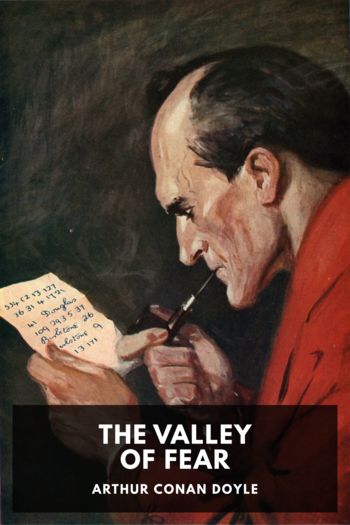The Memoirs of Sherlock Holmes - Arthur Conan Doyle (i can read book club txt) 📗

- Author: Arthur Conan Doyle
Book online «The Memoirs of Sherlock Holmes - Arthur Conan Doyle (i can read book club txt) 📗». Author Arthur Conan Doyle
An instant later our door opened, and a tall young man entered the room. He was well but quietly dressed in a dark-gray suit, and carried a brown wide-awake in his hand. I should have put him at about thirty, though he was really some years older.
“I beg your pardon,” said he, with some embarrassment; “I suppose I should have knocked. Yes, of course I should have knocked. The fact is that I am a little upset, and you must put it all down to that.” He passed his hand over his forehead like a man who is half dazed, and then fell rather than sat down upon a chair.
“I can see that you have not slept for a night or two,” said Holmes, in his easy, genial way. “That tries a man’s nerves more than work, and more even than pleasure. May I ask how I can help you?”
“I wanted your advice, sir. I don’t know what to do and my whole life seems to have gone to pieces.”
“You wish to employ me as a consulting detective?”
“Not that only. I want your opinion as a judicious man—as a man of the world. I want to know what I ought to do next. I hope to God you’ll be able to tell me.”
He spoke in little, sharp, jerky outbursts, and it seemed to me that to speak at all was very painful to him, and that his will all through was overriding his inclinations.
“It’s a very delicate thing,” said he. “One does not like to speak of one’s domestic affairs to strangers. It seems dreadful to discuss the conduct of one’s wife with two men whom I have never seen before. It’s horrible to have to do it. But I’ve got to the end of my tether, and I must have advice.”
“My dear Mr. Grant Munro—” began Holmes.
Our visitor sprang from his chair. “What!” he cried, “you know my name?”
“If you wish to preserve your incognito,” said Holmes, smiling, “I would suggest that you cease to write your name upon the lining of your hat, or else that you turn the crown towards the person whom you are addressing. I was about to say that my friend and I have listened to a good many strange secrets in this room, and that we have had the good fortune to bring peace to many troubled souls. I trust that we may do as much for you. Might I beg you, as time may prove to be of importance, to furnish me with the facts of your case without further delay?”
Our visitor again passed his hand over his forehead, as if he found it bitterly hard. From every gesture and expression I could see that he was a reserved, self-contained man, with a dash of pride in his nature, more likely to hide his wounds than to expose them. Then suddenly, with a fierce gesture of his closed hand, like one who throws reserve to the winds, he began.
“The facts are these, Mr. Holmes,” said he. “I am a married man, and have been so for three years. During that time my wife and I have loved each other as fondly and lived as happily as any two that ever were joined. We have not had a difference, not one, in thought or word or deed. And now, since last Monday, there has suddenly sprung up a barrier between us, and I find that there is something in her life and in her thought of which I know as little as if she were the woman who brushes by me in the street. We are estranged, and I want to know why.
“Now there is one thing that I want to impress upon you before I go any further, Mr. Holmes. Effie loves me. Don’t let there be any mistake about that. She loves me with her whole heart and soul, and never more than now. I know it. I feel it. I don’t want to argue about that. A man can tell easily enough when a woman loves him. But there’s this secret between us, and we can never be the same until it is cleared.”
“Kindly let me have the facts, Mr. Munro,” said Holmes, with some impatience.
“I’ll tell you what I know about Effie’s history. She was a widow when I met her first, though quite young—only twenty-five. Her name then was Mrs. Hebron. She went out to America when she was young, and lived in the town of Atlanta, where she married this Hebron, who was a lawyer with a good practice. They had one child, but the yellow fever broke out badly in the place, and both husband and child died of it. I have seen his death certificate. This sickened her of America, and she came back to live with a maiden aunt at Pinner, in Middlesex. I may mention that her husband had left her comfortably off, and that she had a capital of about four thousand five hundred pounds, which had been so well invested by him that it returned an average of seven percent. She had only been six months at Pinner when I met her; we fell in love with each other, and we married a few weeks afterwards.
“I am a hop merchant myself, and as I have an income of seven or eight hundred, we found ourselves comfortably off,





Comments (0)